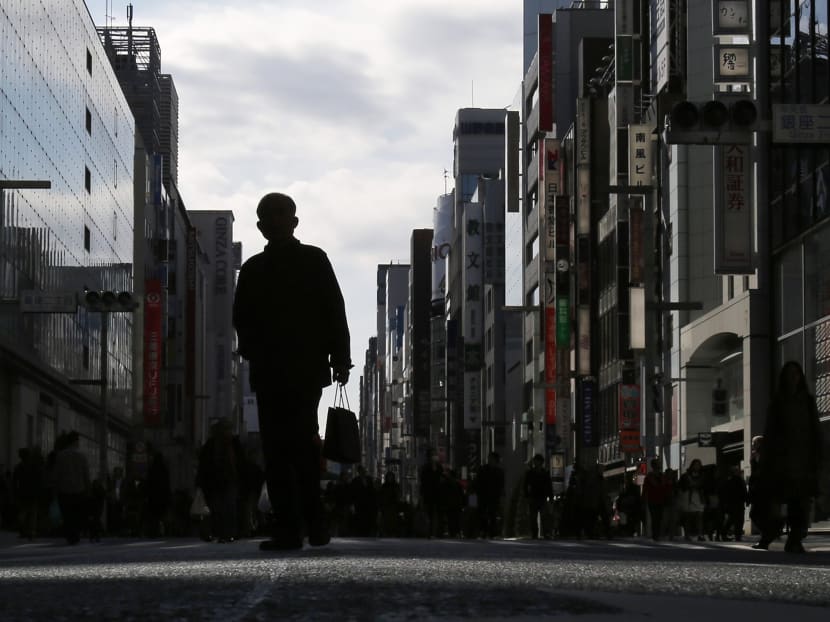Snap poll likely as Japan slips into recession
TOKYO — Japan’s economy unexpectedly slipped into recession in the third quarter, a painful slump that called into question efforts by Prime Minister Shinzo Abe to pull the country out of nearly two decades of deflation.

A man holding a shopping bag walks on a street at Tokyo's Ginza shopping district on Nov 16, 2014. Japan's economy unexpectedly shrank an annualised 1.6 per cent in July-September after a severe contraction in the previous quarter. Photo: Reuters
TOKYO — Japan’s economy unexpectedly slipped into recession in the third quarter, a painful slump that called into question efforts by Prime Minister Shinzo Abe to pull the country out of nearly two decades of deflation.
The economic report set the stage for Mr Abe to delay a further hike in an unpopular sales tax and is likely to upend the country’s political landscape: He is considering dissolving Parliament and calling fresh elections two years before he is required to, people close to him say, and yesterday’s economic report is seen as critical to his decision, which is widely expected to come this week.
Gross domestic product shrank by an annualised 1.6 per cent in the July-to-September period, the Cabinet Office said in a preliminary report yesterday, after plunging 7.3 per cent in the second quarter following a rise in the sales tax in April. GDP had been forecast by economists to rebound by 2.1 per cent in the latest quarter, but consumer spending and exports remained weak, saddling companies with huge inventories to work off.
The second consecutive quarterly decline in the world’s third-largest economy threatens to drag on growth throughout Asia at a time when China — the second-largest economy in the world — is growing at the slowest pace in more than two decades amid structural reforms and factory overcapacity.
Japanese stocks plunged and the yen plummeted to a seven-year low yesterday. The benchmark Nikkei-225 stock index closed down 3 per cent, leading losses throughout the region.
Hong Kong’s Hang Seng Index fell 1.2 per cent, while China’s Shanghai Composite Index lost 0.2 per cent despite the fanfare from the launch of the stock link between the two exchanges. In Singapore, the Straits Times Index shed 0.8 per cent.
The yen tumbled as much as 0.7 per cent to 117.05 per US dollar, the weakest since October 2007, before recovering to 116.50.
The recession comes nearly two years after Mr Abe returned to power, riding on a promise to revive the economy with the “three arrows” of massive monetary stimulus, increased spending and structural reforms that have come to define Abenomics.
Rising sales taxes have been blamed for triggering the downturn by deterring consumer spending and, with the economy in recession, the chances that Mr Abe will seek a new mandate from voters to alter the government’s tax programme have increased significantly.
The tax plan is intended to curb Japan’s immense government debt, which at about two-and-a-half times GDP is the largest in the developed world. However, there are concerns that after years of sluggish wage growth, consumer confidence is still too weak to handle a further increase. Instead of solving the debt problem, heavier taxes could push the economy back into a downward slide, as the latest data showed.
“Raising the consumption tax is supposed to increase government revenues, but if we fall back into deflation, it will all be for nothing,” Mr Abe said at the Group of 20 summit in Brisbane on Sunday.
Yesterday, Mr Abe said the GDP figures were not good, adding he would analyse the data calmly before deciding whether to press ahead with a second increase in the sales tax to 10 per cent in October next year. The tax was raised to 8 per cent from 5 per cent in April.
A decision to delay the hike for 18 months could come as early as today, when Mr Abe may also state his intention to call an election for Parliament’s Lower House, media reports said yesterday. Ruling party lawmakers expect the poll to be held on Dec 14.
An economic adviser to Mr Abe called the recession “shocking” and urged the government to take steps to support the economy.
“This is absolutely not a situation in which we should be debating an increase in the consumption tax,” said Mr Etsuro Honda, a University of Shizuoka professor and a prominent architect of Mr Abe’s reflationary policies.
Economy Minister Akira Amari said some form of economic stimulus would be likely, but added it would be hard to craft an exceptionally big package because of the need for fiscal discipline. No election for the Lower House need be held until late 2016, but political insiders say Mr Abe wants to lock in his mandate while his ratings are relatively robust. Next year, he is expected to push ahead with unpopular policies, such as restarting reactors that went offline after the Fukushima nuclear crisis as well as a shift away from Japan’s post-war pacifism.
Facing a divided and weak opposition, Mr Abe’s Liberal Democratic Party is expected to keep its majority in the Lower House, but it could lose some seats. AGENCIES





